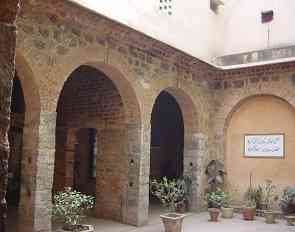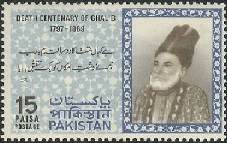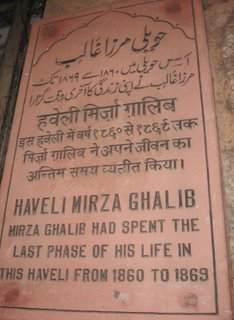Adnan Ahmad
hoi muddat ke Ghalib mar gaya par yaad aataa hai
woh har ek baat pe kehna ke yooN hota to kia hota

One such person is Mirza Asadullah Khan Ghalib. Given his towering and well-known stature, instead of writing purely a biographic piece I will be short and mention a few of his verses and a few of the highlights of this wizard’s life.
Ghalib’s portrait to the right is from urdustan.com
Through earlier years of my life the name Mirza Ghalib invoked a stereotypical image in my mind about yet another old poet from the subcontinent writing on the classical subjects of romance and appearing thoroughly outdated in my world.
That was until I came across Gulzar‘s serial Mirza Ghalib and found outsides of Ghalib and meanings of his verses that I had not known before.
Here is a sample:
![]()
 The year was 1990 and someone in our family had gained access to the tapes that were not available in the market yet. Over the course of next few years of my high school I watched the serial over and over again, read his poetry and about his life, with each attempt increasing my fascination with the poet and his poetry. Photo to the left is the ‘haveli’ where Ghalib lived.
The year was 1990 and someone in our family had gained access to the tapes that were not available in the market yet. Over the course of next few years of my high school I watched the serial over and over again, read his poetry and about his life, with each attempt increasing my fascination with the poet and his poetry. Photo to the left is the ‘haveli’ where Ghalib lived.
And there are still days when I find new meanings in his verses I had heard and known for ages. 
Image to the right is a postal stamp issued by Government of Pakistan in commemoration of Mirza Ghalib
This is the collection of poems about which a famous Urdu critic from the 19th century, Abdul Rehman Bijnori, once said that there are two books sent from the heaven to the sub-continent, one is Holy Geeta (muqqaddas Vaids) and the other is deewan-e-Ghalib. Still it baffles me to think how a 25-year old can express such mature sorrow in a verse like:
ghar meiN tha kia ke tera gham osay ghaarat karta
woh jo rakhtay the hum ik hasrat-e-taameer so hai
And another verse which goes like this:
hoa jab gham se yooN be-hiss to gham kia sar ke kaTnay ka
na hotaa gar juda tan se to zaanoo par dharaa hota

Photo to the right is a plaque at mazar-i-Ghalib
I think whatever he claimed for himself was an understatement. Many including myself, do consider him a philosopher, a great scholar and even a wali (saint) of his time. And on that tangent, I don’t think I’ve heard a better elaboration of tawheed (oneness of God) than his verse:
hum muwwahid haiN hamara kashe hai tark-e-rusoom
millateN jab miT gayeeN, ajzaa-i-imaaN ho gayeeN
In anoher instance he accepts God in a way few of us can:
jaaN dee, dee hoi osee kee thee
haq to ye hai ke haq adaa na hoa
Finally, a verse that stays with me all the time and unfolds itself in new ways each time I think about it.
hai kahaaN tammanna ka doosra qadam ya-rabb
hum ne dasht-e-imkaaN ko ek naqsh-e-paa paaya
Then, there is of course the letters Ghalib wrote. Here is a wonderful sample read by Zia Mohiuddin.
Recommended Website on Ghalib:
(1) There is a very good biography of Ghalib present at a webpage here.
(2) Best of Ghalib



















































Now we are lost, the town of Prem Nagar.
I am modifying myself, not a hand or foot.
Khudiye lost his title, leaped his word, then went on
The first turban was the first home, who would be Nirvair?
Bula haha hai hai bhi jahinin, no jahna hai gaire
Wow
banaa kar faqiiro.n kaa ham bhes ‘Gaalib’
tamaashaa-e-ahl-e-karam dekhte hai.n
There are very few classical poets whose had influence on literature similar to Ghalib. His verse like Mir were rather simple but deep at the same time.
In India, Jagjit Singh and Chitra Singh were first to put Kalam e Ghalib to mainstream, in form of Gulzar’s drama Mirza Ghalib.
In Pakistan, Ghalib has been sung by many legends, e.g. Yeh Na Thi Humari Kismet by Tina Sani at https://www.thesufi.com/tina-sani-sings-ye-na-thi- hamari-qismat-by-mirza-ghalib/